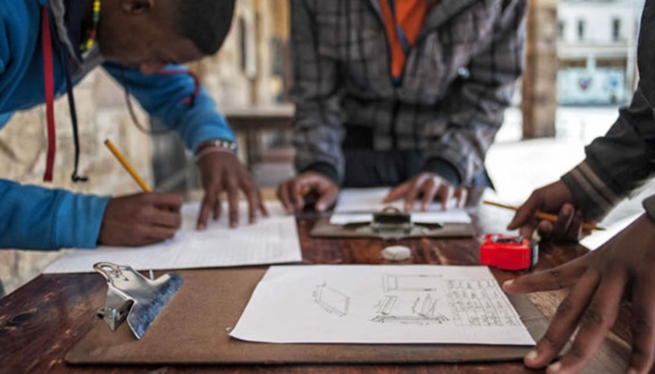SOUTH AFRICA: Salesian Institute Adds Solar Panels to Save Electricity Costs and Ensure Consistent Power to Classrooms

(MissionNewswire) The Salesian Institute in Cape Town, South Africa has recently added solar panels to its campus buildings that provide education and technical skills training to youth. In recent years, the Salesian Institute has been faced with huge expenses for electricity and also frequent power losses that disrupted the educational environment. In response, Salesian missionaries have launched a project to purchase and install solar panels on all of the buildings.
By making this change, the Salesian Institute will have a continuous supply of electricity while reducing the cost. Funding can then be diverted to training and equipment maintenance and upgrades. With the purchase and commissioning of the solar panels, not only will the Salesian Institute have a clean and healthy environment, but it will be reinforcing an additional educational message about environmental impact. This also facilitates the sustainability of the mission and improves the quality of education offered by Salesians missionaries.
“Salesian programs are constantly evolving and advancing to meet local demands and keep up-to-date with technology and changes that can save programs the limited funding they have,” says Father Mark Hyde, executive director of Salesian Missions, the U.S. development arm of the Salesians of Don Bosco. “The Salesian Institute provides a valuable service to the community educating youth and helping them to gain the skills necessary for employment.”
Poverty is extensive in South Africa with more than 45 percent of the population living below the poverty line, according to UNICEF. A significant percentage of the population struggles to survive on less than one dollar a day. Salesian missionaries have been working to bring hope, particularly to poor youth in South Africa. From empowering girls and young women to building schools and teaching trade skills, Salesian missionaries have a long history of affecting change in the country.
Through the Institute’s Youth Projects program, Salesian missionaries provide shelter, education and workforce development services, meeting the basic needs of the youth they serve while helping them break the cycle of poverty. The Institute’s Youth Projects program consists of five main programs – an outreach program, a hostel for homeless youth, the Learn-to-Live education program and two workforce development programs. The projects are managed by a diverse team, some of whom live on the premises to support youth in the hostel and outreach programs.
The Institute’s outreach program functions as a drop-in center working to build relationships with youth who live on the street or in government-built townships in the southeast of Cape Town, called the Cape Flats. Outreach workers provide support and assistance to close to 125 youth each month whose lives are often characterized by drugs, gangs, violence and abuse. Youth are able to access counseling, drug awareness and prevention programs, educational services and job assistance.
For those in need of additional care, a youth hostel accommodates 24 males between the ages of 18 and 26 who would not otherwise be able to access the Institute’s two workforce development programs. In addition to offering formal education, youth are invited to participate in informal life skills training and recreational activities, which help them focus on their studies and plan for their futures. Once training courses have been completed, job placement officers assist students in finding and retaining employment. Each year the hostel serves more than 60 young men.
The Learn-to-Live education program is a school designed specifically for vulnerable and at-risk children and youth. Recognized as an independent school by the Western Cape Education Department, the program provides basic education and skills training for youth at risk who, for a variety of socio-economic reasons, are not able to succeed in mainstream schools. The school offers various levels of education for 13- to 19-year-old students. All students participate in academic classes and skills workshops and receive a cooked meal each day. Demand for the program is high, and 100 youth from the local communities and shelters in and around Cape Town access the program each day.
###
Sources:
ANS – South Africa – solar panels to reduce the cost of electricity and improve education
UNICEF – South Africa




